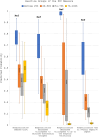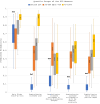Patient-centered inpatient psychiatry is associated with outcomes, ownership, and national quality measures
- PMID: 38756837
- PMCID: PMC10986256
- DOI: 10.1093/haschl/qxad017
Patient-centered inpatient psychiatry is associated with outcomes, ownership, and national quality measures
Abstract
Following discharge from inpatient psychiatry, patients experience elevated suicide risk, unplanned readmission, and lack of outpatient follow-up visits. These negative outcomes might relate to patient-centered care (PCC) experiences while hospitalized. We surveyed 739 former patients of inpatient psychiatric settings to understand the relationship between PCC and changes in patients' trust, willingness to engage in care, and self-reported 30-day follow-up visits. We also linked PCC measures to facility-level quality measures in the Inpatient Psychiatric Facility Quality Reporting program. Relative to patients discharged from facilities in the top quartile of PCC, those discharged from facilities in the bottom quartile were more likely to experience reduced trust (predicted probability [PP] = 0.77 vs 0.46; P < .001), reduced willingness to go to the hospital voluntarily (PP = 0.99 vs 0.01; P < .001), and a lower likelihood of a 30-day follow-up (PP = 0.71 vs 0.92; P < .001). PCC was lower among patients discharged from for-profits, was positively associated with facility-level quality measures of 7- and 30-day follow-up and medication continuation, and was inversely associated with restraint use. Findings underscore the need to introduce systematic measurement and improvement of PCC in this setting.
Keywords: mental health care; patient experience; policy; public reporting; quality.
© The Author(s) 2023. Published by Oxford University Press on behalf of Project HOPE - The People-To-People Health Foundation, Inc.
Conflict of interest statement
Conflicts of interest Please see ICMJE form(s) for author conflicts of interest. These have been provided as supplementary materials.
Figures


Similar articles
-
Institutional Betrayal in Inpatient Psychiatry: Effects on Trust and Engagement With Care.Psychiatr Serv. 2024 Nov 12:appips20240022. doi: 10.1176/appi.ps.20240022. Online ahead of print. Psychiatr Serv. 2024. PMID: 39529497
-
Variation in Facility-Level Rates of All-Cause and Potentially Preventable 30-Day Hospital Readmissions Among Medicare Fee-for-Service Beneficiaries After Discharge From Postacute Inpatient Rehabilitation.JAMA Netw Open. 2019 Dec 2;2(12):e1917559. doi: 10.1001/jamanetworkopen.2019.17559. JAMA Netw Open. 2019. PMID: 31834398 Free PMC article.
-
Measures of Care Coordination at Inpatient Psychiatric Facilities and the Medicare 30-Day All-Cause Readmission Rate.Psychiatr Serv. 2020 Oct 1;71(10):1031-1038. doi: 10.1176/appi.ps.201900360. Epub 2020 Aug 25. Psychiatr Serv. 2020. PMID: 32838680 Free PMC article.
-
Prevention of suicide and attempted suicide in Denmark. Epidemiological studies of suicide and intervention studies in selected risk groups.Dan Med Bull. 2007 Nov;54(4):306-69. Dan Med Bull. 2007. PMID: 18208680 Review.
-
Systematic reviews of the effectiveness of day care for people with severe mental disorders: (1) acute day hospital versus admission; (2) vocational rehabilitation; (3) day hospital versus outpatient care.Health Technol Assess. 2001;5(21):1-75. doi: 10.3310/hta5210. Health Technol Assess. 2001. PMID: 11532238 Review.
Cited by
-
COVID-19 Mitigation Activities in Inpatient Psychiatry Were Associated With Patient-Reported Institutional Betrayal, Changes in Trust, and Fear of Getting Sick.Inquiry. 2024 Jan-Dec;61:469580241237689. doi: 10.1177/00469580241237689. Inquiry. 2024. PMID: 38462912 Free PMC article.
-
Inpatient Psychiatric Care in the United States: Former Patients' Perspectives on Opportunities for Quality Improvement.J Patient Exp. 2024 May 30;11:23743735241257810. doi: 10.1177/23743735241257810. eCollection 2024. J Patient Exp. 2024. PMID: 38827226 Free PMC article.
-
Private Equity Among US Psychiatric Hospitals.JAMA Psychiatry. 2025 Jul 1;82(7):701-708. doi: 10.1001/jamapsychiatry.2025.0689. JAMA Psychiatry. 2025. PMID: 40397464
-
Voices of Students in Crisis: Qualitative Interviews with College Students Hospitalized for Psychiatric Distress.Psychiatr Q. 2025 Aug 15. doi: 10.1007/s11126-025-10199-7. Online ahead of print. Psychiatr Q. 2025. PMID: 40815338
-
Unlocking the door to supportive housing: addressing the challenge of post-discharge transitions in safety-net psychiatric care.Gen Psychiatr. 2024 Dec 7;37(6):e101608. doi: 10.1136/gpsych-2024-101608. eCollection 2024. Gen Psychiatr. 2024. PMID: 39660038 Free PMC article. No abstract available.
References
-
- Ward-Ciesielski EF, Rizvi SL. The potential iatrogenic effects of psychiatric hospitalization for suicidal behavior: a critical review and recommendations for research. Clin Psychol Sci Practice. 2021;28(1):60.
-
- Robins CS, Sauvageot JA, Cusack KJ, Suffoletta-Maierle S, Frueh BC. Special section on seclusion and restraint: consumers’ perceptions of negative experiences and “sanctuary harm” in psychiatric settings. Psychiatr Serv. 2005;56(9):1134–1138. - PubMed
-
- Frueh BC, Knapp RG, Cusack KJ, et al. . Special section on seclusion and restraint: patients’ reports of traumatic or harmful experiences within the psychiatric setting. Psychiatr Serv. 2005;56(9):1123–1133. - PubMed
LinkOut - more resources
Full Text Sources
Miscellaneous
